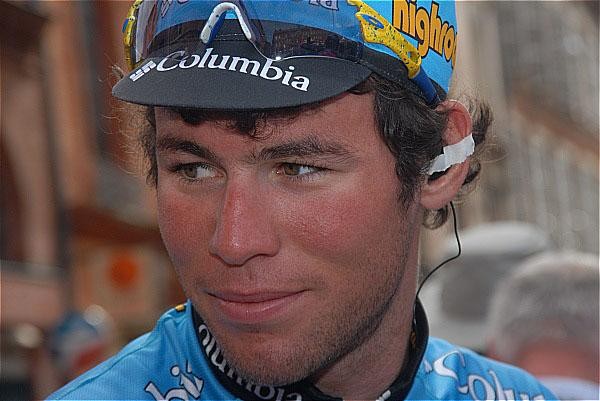Cavendish unfazed by dangerous sprints
By Gregor Brown in Pau To be a sprinter in the Tour de France, a rider must be unafraid of a close...

By Gregor Brown in Pau
To be a sprinter in the Tour de France, a rider must be unafraid of a close encounter with the pavement at 60 kilometres per hour. In the rain-soaked finale to Toulouse, Mark Cavendish paid his Columbia team back for its hard work by demonstrating that he is no fazed by his profession's dangers when he delivered his second sprint victory.
"Sure it is dangerous, but if you start to think about that you are not going to win," said Cavendish during the race's first rest day in Pau.
Cavendish is well aware of the dangers after fighting his way to the front to come up victorious on two occasions in the 2008 Tour de France. Cavendish's first win was a dry and sunny affair in Châteauroux, but in Toulouse – with all the lead-out focused on Columbia and intermittent showers dampening the roads – the stakes rose. He confirmed his position in the top ranks when he topped off a textbook lead-out by Columbia.
Led by Marcus Burghardt, Columbia finished off the escape at 3500 metres out. "We did a lead-out for Mark by taking over at five kilometres before the finish. Everyone did their job really well," described Burghardt to Cyclingnews. Thomas Lövkvist, George Hincapie, then-race leader Kim Kirchen and Gerald Ciolek followed Burghardt's lead-out to deliver the win.
Cavendish backed this up three days later in Pau. He described Columbia's work as integral to his success, something that is different from sprinters Robbie McEwen and Oscar Freire, who are basically working on their own.
"First and foremost, it takes an amazing team to get you there to the finish. I have a strong team that takes me there and puts out the speed. You have to save all the power you can so you can use it over those last few hundred metres – that is when you need a great team behind you."
Get The Leadout Newsletter
The latest race content, interviews, features, reviews and expert buying guides, direct to your inbox!
Columbia protected him by making sure he made it through the Pyrénéan Mountains within the time cut. Domestique Bernhard Eisel shepherded Cavendish on Monday's stage to Hautacam, a day that became worse by a stray football.
"We were riding along when a football appeared rolling onto the course," Eisel told Cyclingnews at the team's hotel in Pau. "I saw it coming, a motorbike policeman kicked it away but it must have bounced back."
Cavendish went tumbling down and then American Danny Pate collided into him from behind. "It was sort of funny, Cavendish blamed Pate because he saw his water bottle lying there and he assumed that it caused the crash."
The footballs and mountains have passed for now and Cavendish might get a chance to return to the 'normal' danger of the sprints when the race enters four 'transitional stages' before the next set of high-mountain stages.
"There is not much going through your mind in those final metres apart from being first across the finish line. You haven't got time to think about everything else – you haven't got time to think about consequences or anything... you just have to be first because that is what matters."
Being first is all that is on Cavendish's mind. Columbia will back that that ambition and get to the front pulling Cavendish through the dangers and to a third win, likely to come in stages Narbonne (12), Nîmes (13) or Paris (21).
"If you start to think about the dangers you are not going to win. If you are driving a car and come fast into a corner there is something in your mind that says 'maybe I should slow down because maybe the brakes or tires won't work...,' but in cycling you don't have that and you can't have that.
"You can't think of the consequences, you just have to be first across the line."